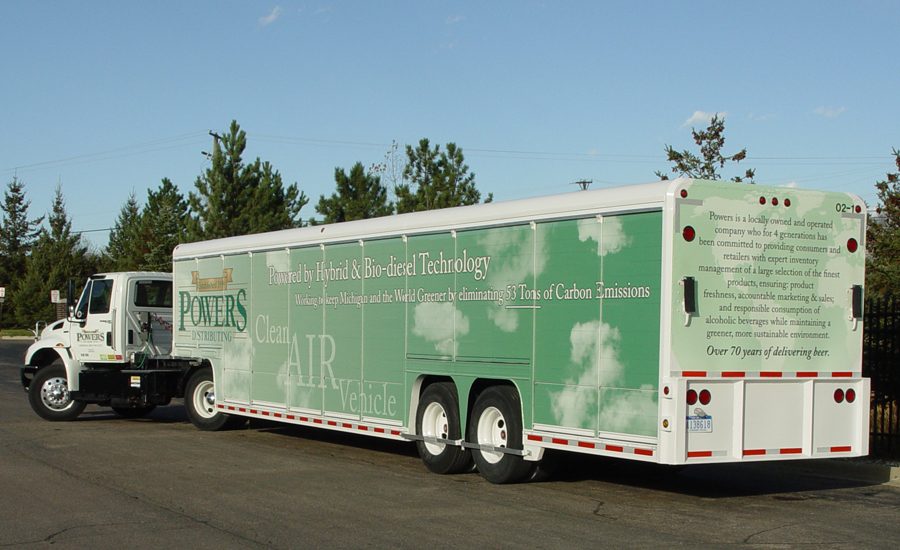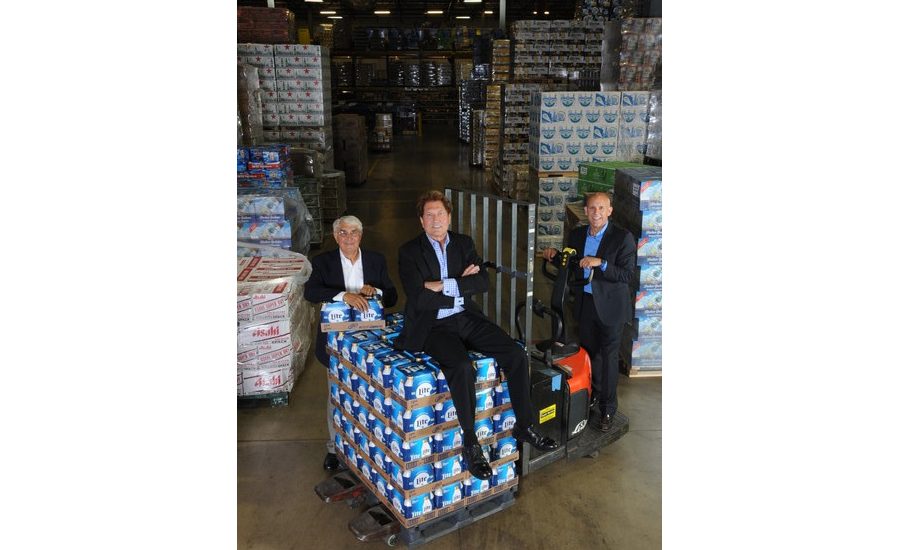Powers Distributing employs hybrid, biodiesel fleets
Michigan wholesaler credits strong business partnerships

With hybrids representing the majority of their fleet, Orion, Michigan-based Powers Distributing is among the leading beverage fleets in North America when it comes to deploying "green" solutions. They've also been recognized multiple times for their innovative fleet graphics.

A family-owned business that has thrived through volatile economic times, Powers Distributing is currently run by the founder's grandsons, Gerald (Left) and Robert (Center) Powers. COO Gary Thompson (Right) manages the company's fleet operations.


Today’s business environment requires distributors to constantly pursue opportunities that improve the efficiency of their fleet operations. At Orion, Mich.-based Powers Distributing, this pursuit of efficiency pre-dates the economic roller coaster of the past decade and extends into other areas of the business.
The grandfather of the company’s current co-presidents, Robert and Gerald Powers, founded the distributorship in 1939. Today, the company distributes MillerCoors products for the northernmost two of the three counties that make up the Detroit metro area. Operating with more than 200 employees, the company’s fleet has more than 40 drivers.
Even though Powers Distributing is family-owned and -operated, the company relies on guidance from an independent advisory/planning board that brings in additional expertise in business, law and finance.
“The Michigan economy and the auto industry have rebounded over the past few years, partly because Michigan has been a ‘hotbed’ of craft beer. The state is the fifth largest for craft brewers in the country and the state’s No. 1 industry is tourism,” says Chief Operations Officer and General Manager Gary Thompson. “Both of these have placed Powers in a unique position with respect to the beer distribution industry. The environment is ever under consideration in Michigan and complexity in beer is the name of the game.”
Powers Distributing has been able to survive, and even thrive, thanks to its culture of seeking out and implementing new, efficient ideas in every area of the company.
A key example of the company’s drive for efficiency was its aggressive deployment of hybrid drivetrain technology. Although some large bottling operations deployed hundreds of hybrid fleets, neither they, nor any of the other beverage fleets testing hybrid trucks, reached a concentration of even 1 percent hybrids. The average is 0.37 percent.
On the other hand, Powers has 31 hybrids among its fleet of 43 tractors, representing a concentration more than 100 times greater than the industry average. The company has found real success with the Peterbilt and Kenwoth trucks equipped with Eaton’s hybrid system, it says.
“Eaton especially, along with both Peterbilt and Kenworth, have been great partners for Powers,” Thompson says.
Without using any incentives beyond the previously available federal tax credit, Powers still expects the hybrid option to reach a return-on-investment (ROI) break-even point within seven to eight years, compared with the company’s normal target of five years. With the fuel savings, roughly 30 percent on the Kenworth and Peterbilt models, Thompson is projecting that the break-even point likely will be within the useful life of the asset.
Another highly visible benefit of the hybrid technology is realized inside the company’s main office/warehouse building. Like many other fleets operating in a northern climate, Powers loads the side-load portion of its fleet in one of two indoor drive-through lanes.
Because the hybrid trucks run on electric-only power at low speeds, they emit no diesel exhaust while indoors. “The biggest thing we noticed is a lack of diesel soot in the building,” Thompson says. “The building stays cleaner, our offices stay cleaner and, of course, the noise level is reduced. So we’ve addressed a safety issue, as well as a general health and cleanliness issue.”
Another example of “green” benefits is the company’s use of biodiesel in its delivery fleet. “When we began looking at biodiesel, we found that not all of our trucks could use B-20, so we started trading out the incompatible trucks and got the entire fleet B-20 capable by 2010,” Thompson says. “Michigan weather makes it difficult to run B-20 year-round, so we cut back to B-5 from December through March.”
To ensure the quality of the biodiesel, Powers maintains and monitors its own 12,000-gallon above-ground fuel tank. Initially, Thompson conducted regular testing of the fuel deliveries, but once he gained confidence in the reliability of his supplier, Thompson discontinued testing the deliveries.
With a relatively new tank, maintenance is minimal. “We’re just now coming due for the first major maintenance interval on the tank,” Thompson says. “We do have the product sampled once it’s in the tank to make sure we’re not growing any micro-organisms.”
Pursuing efficiency in fleet operations isn’t limited to the on-highway vehicles at Powers. Thompson says Dave Kessman, director of operations for Powers, has taken the company to a “rapid intermittent charge” process for the company’s lift trucks. Each battery pack spends less time and energy charging and more time working to increase efficiency and to achieve maximum life from its battery packs.
Another recent change at Powers has been a near-total shift over to the Ford Transit Connect compact vans for sales and merchandising-support vehicles. Thompson cites improved fuel economy, cargo space and “great support” from Ford for the shift to the compact vans.
Regarding outsourcing maintenance, Thompson offers advice similar to most top fleet managers. “Make sure you get a good business partner in maintaining your fleet. Give an eye to multiple-year agreements to control cost and always keep abreast of the technology,” Thompson says. “You may end up doing what we have done and take the maintenance business back in house, which we did in 2015.”
Looking for a reprint of this article?
From high-res PDFs to custom plaques, order your copy today!







